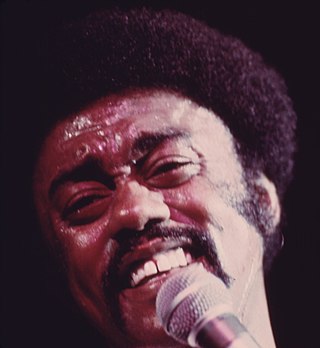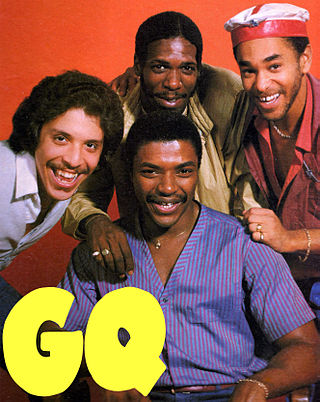
Barry Eugene White was an American singer and songwriter. A two-time Grammy Award winner known for his bass voice and romantic image, his greatest success came in the 1970s as a solo singer and with the Love Unlimited Orchestra, crafting many enduring R&B, soul, funk, and disco songs such as his two biggest hits: "Can't Get Enough of Your Love, Babe" and "You're the First, the Last, My Everything".

The Isley Brothers are an American soul group originally from Cincinnati, Ohio, that began as a vocal trio consisting of the brothers O'Kelly Isley Jr., Rudolph Isley and Ronald Isley in the 1950s. With a career spanning over seven decades, the group has enjoyed one of the "longest, most influential, and most diverse careers in the pantheon of popular music".

Johnnie Harrison Taylor was an American recording artist and songwriter who performed a wide variety of genres, from blues, rhythm and blues, soul, and gospel to pop, doo-wop, and disco. He was initially successful at Stax Records with the number-one R&B hits "Who's Making Love" (1968), "Jody's Got Your Girl and Gone" (1971) and "I Believe in You " (1973), and reached number one on the US pop charts with "Disco Lady" in 1976.

KC and the Sunshine Band is an American disco and funk band that was founded in 1973 in Hialeah, Florida. Their best-known songs include the hits "Get Down Tonight", "That's the Way ", "(Shake, Shake, Shake) Shake Your Booty", "I'm Your Boogie Man", "Keep It Comin' Love", "Boogie Shoes", "Please Don't Go", and "Give It Up". The band took its name from lead vocalist Harry Wayne Casey's last name ('KC') and the 'Sunshine Band' from KC's home state of Florida, the Sunshine State. The group had five number one singles on the Billboard Hot 100 chart in the 1970s.

The twelve-inch single is a type of vinyl gramophone record that has wider groove spacing and shorter playing time with a "single" or a few related sound tracks on each surface, compared to LPs which have several songs on each side. It is named for its 12-inch (300 mm) diameter that was intended for LPs. This technical adaptation allows for louder levels to be cut on the disc by the mastering engineer, which in turn gives a wider dynamic range, and thus better sound quality. This record type, which is claimed to have been accidentally discovered by Tom Moulton, is commonly used in disco and dance music genres, where DJs use them to play in clubs. They are played at either 33+1⁄3 or 45 rpm. The conventional 7-inch single usually holds three or four minutes of music at full volume. The 12-inch LP sacrifices volume for extended playing time.
Chicago soul is a style of soul music that arose during the 1960s in Chicago. Along with Detroit, the home of Motown, and Memphis, with its hard-edged, gritty performers, Chicago and the Chicago soul style helped spur the album-oriented soul revolution of the early 1970s.
All Platinum Records was a record company started in 1967 by singer/writer/producer Sylvia Robinson and her husband, businessman Joe Robinson, who had previously worked in the recording industry.
D.C. LaRue is an American singer, songwriter and producer. His music was successful in clubs and on dance music charts worldwide during the 1970s and early 1980s.
Lee Garrett is an American rhythm and blues singer-songwriter, most famous for co-writing the classic song "Signed, Sealed, Delivered I'm Yours". He recorded several solo singles during the 1960s, one of which was "I Can't Break the Habit". He had a hit in 1976 with "You're My Everything". Artists who have covered his compositions include Taka Boom, Carl Graves, Peter Frampton, Denny McCaffrey, Eddie Money, Jackie Moore, Marlena Shaw, The Spinners, Frankie Valli and many more.
The Pioneers are a Jamaican reggae, soul and rocksteady vocal trio, whose main period of success was in the 1960s. The trio has had different line-ups, and still occasionally performs.

Ray, Goodman & Brown is an American R&B vocal group. The group originated as the Moments, who formed in the mid-1960s and whose greatest successes came in the 1970s with hits including "Love on a Two-Way Street", "Sexy Mama", and "Look at Me ". In 1978, they changed their name to Ray, Goodman & Brown and had further hits, including "Special Lady".

GQ was an American musical group formed in The Bronx, New York, primarily noted for its success in funk, R&B, soul music and disco. The core membership of the group commenced playing professionally, under different group names, as of 1968.
British soul, Brit soul, or the British soul invasion, is soul music performed by British artists. Soul has been a major influence on British popular music since the 1960s, and American soul was extremely popular among some youth subcultures, such as mods, skinheads, and the Northern soul movement. In the 1970s, soul gained more mainstream popularity in the UK during the disco era.

"Always and Forever" is an R&B song written by Rod Temperton and produced by Barry Blue. It was first recorded by the British-based multinational funk-disco band Heatwave in 1976. Released as a single on 3 December 1977, the song is included on Heatwave's debut album Too Hot to Handle (1976) and has been covered by numerous artists, becoming something of a standard.
"Sending Out An S.O.S." is a 1975 song for singer Retta Young. It charted in the US on the Billboard and Cash Box charts. It charted also in the UK where it did better. It is considered a classic disco song and appears on a multitude of compilations.
Retta Young is an American former singer best known for her 1975 disco hit "Sending Out An S.O.S." which made the Billboard Hot Soul Singles, Cash Box Top 100 R&B and UK Top 30 charts. She released an album and three singles during the 1970s.
Paul Kyser is an American promoter, record label owner, singer, songwriter, record producer and arranger. He wrote and co-produced the hit "Dawning of Love" with Tom Vetri for Devotion. He also wrote "Body and Soul " for the group Soul Generation and "Where Were You " for Jimmy Briscoe and the Little Beavers. Along with Leon Stuckey he co-wrote "Just How Sweet Is Your Love" for Rhyze, which appears on the Boogie's Gonna Getcha: '80s New York Boogie compilation album. He co-wrote "Be My #2" which appears on the R. Kelly Untitled album. He is also credited with discovering Jimmy Briscoe & The Little Beavers.

Brass Construction II is the second album by American funk-disco band Brass Construction, released in October 1976 by United Artists Records. Recorded with producer Jeff Lane, it followed the success of the group's self-titled 1975 album. Band leader Randy Muller sought to diversify the group's sound, aiming for a "multi-dimensional" approach with disparate musical influences, including styles of Latin, reggae and Afro-Cuban music, and more specific lyrical topics, with each of the songs featuring a subtitle that Muller said defined each track.
"Hypertension" was a hit song by New Jersey funk band, Calendar in 1975. It was written by Paul Kyser and Leon Stuckey. Its main success was in the UK where it reached the top ten in the disco chart.
George Kerr is a musician and record producer who has worked with a multitude of recording artists during the 1960s and 1970s.







